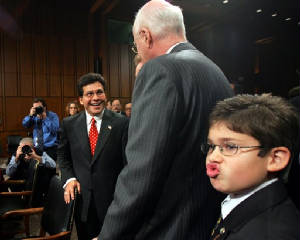|
Nomination of Alberto Gonzales: Insanity.
| Mr. Gonzales's son. |

|
| Looks like he could use some "discipline" similar to that which our detainees get. |
Here are some facts we know about Mr. Gonzales. These are
all quotes taken from Senators during his confirmation hearings.
- He declined to answer or evaded many of the questions we asked him at
the hearing.
- He has failed to provide full and forthright answers to our follow-up
written questions.
- He says he can't remember what specific interrogation methods were discussed.
- He can't remember who asked for the Justice Department's legal advice
in the first place.
- He can't remember whether he made any suggestions to the Department on
the drafting of the Bybee Memorandum, although he admits that "it would not be unusual" for his office to have done so.
- He doesn't know how the memo was forwarded to the Defense Department and
became part of its "Working Group Report" in April 2003, which was used to justify the new interrogation practices at Guantanamo. Those practices,
in turn, "migrated" to military operations in Afghanistan
and Iraq.
- He refuses to provide or even conduct a search for documents relating
to his request for the Goldsmith Memorandum.
- He refuses to say anything about his discussions with the author of the
memo.
- He says he doesn't know whether the C.I.A. acted on the memo, as the Washington
Post reported.
- He even says that he has never had the "occasion to come to definitive
views" about the analysis in the memo.
- (The committee) has repeatedly asked Mr. Gonzales to provide documents
on his meetings, evaluations, and decisions on the Bybee Memorandum. These documents would speak volumes about all the issues
Mr. Gonzales says he has trouble remembering. Yet he refuses to provide the documents. He won't even search for them. In his
responses to my written questions, Mr. Gonzales stated eight times that he has not "conducted a search" for the requested
documents. In other words, the documents we want may exist, but he's not going to look for them. It's hard to imagine a more arrogant insult to this Committee's oversight role.
- Mr. Gonzales refused to answer other questions and requests on the grounds
that they would involve "classified information," "predecisional" or "internal deliberations," or "deliberative material."
None of these grounds is sufficient. There is no legal bar to providing classified materials to Congress; they're routinely
provided to Congress and discussed in closed meetings. There is no recognized privilege for "predecisional" or "deliberative"
materials. The only exception is in the rare case where the President himself
determines that his interest in secrecy outweighs the public interest in disclosure, and he himself invokes executive privilege.
That hasn't happened here.
- In his response to our questions, Mr. Gonzales said that he has "no specific
recollection of [his] reaction to the conclusions, reasoning, or appropriateness as a matter of policy of any of the particular
sections of the memorandum at the time [he] received it two-and-a-half years ago."
More information discussed in the confirmation hearings:
The Bybee Memorandum made three basic points.
First, it said that torture means only acts
that inflict the kind of pain experienced with death or organ failure. To commit torture, it said, a government official must
have the "precise objective" of inflicting severe pain. If causing such harm was not his precise objective - even if he knew
"that severe pain would result from his actions" - he should be acquitted.
Second, the memo said that the President
has the inherent constitutional power as Commander-in-Chief to override the prohibitions against torture enacted by Congress.
Third, it said that government officials
can avoid prosecution for their acts of torture by invoking the defenses of "necessity" or "self-defense" - even though the
Convention Against Torture, which Congress ratified in 1994, states very clearly that "no exceptional circumstances whatsoever"
may be invoked as a justification for torture.
- The Bybee Torture Memorandum was written at Mr. Gonzales's request. After
its release in August 2002, the memo was official policy on interrogations by the Defense Department and the C.I.A. for two
and a half years until it was finally repudiated last month, on the eve of Mr. Gonzales's nomination.
- Yet he refuses to tell us anything about how the Bybee Memorandum was
written and why he ordered it. We know from press reports that the C.I.A. asked him for advice on how far the agency could
go in interrogating detainees. In July 2002, he held meetings with other Administration officials to discuss how to legally
justify certain interrogation methods. He refuses to tell us anything about those meetings.
- We have a torture problem. The F.B.I. says so. The Red Cross says so.
The Defense Intelligence Agency says so. The Defense Department says it investigated more than 300 cases of detainee torture,
sexual assault, and other abuse. Additional allegations of abuse are being reported
on a daily basis. Yet Mr. Gonzales can't remember any details of how it happened.
- Harold Koh - a leading scholar of international law and Dean of the Yale
Law School, who served in both the Reagan and Clinton Administrations - calls the memo "the most clearly legally erroneous
opinion" he has ever read. I hope every member of the Committee will take the time to review Harold Koh's testimony.
- He did say, however, that he believed at the time that it was "a good-faith
effort" to interpret the Anti-Torture Statute. At the hearing, he told Senator Leahy: "I don't recall today whether or not
I was in agreement with all of the analysis, but I don't have a disagreement with the conclusions then reached by the Department."
- Let's be clear: there is no such thing as a "Commander-in-Chief override."
It's certainly not in my copy of the Constitution. It appears to be something that Mr. Gonzales and his colleagues have invented.
- Congress has repeatedly passed laws and ratified treaties prohibiting
torture and mistreatment of detainees, and the President does not have the power to violate them. When a nominee claims that
such an override exists, or suggests that those who commit torture might be able to invoke the defense of "necessity" or "self-defense"
notwithstanding Congress' categorical prohibition against such a defense, it sends a message that "anything goes" to our troops
and intelligence officers in the field. To allow such extreme claims to become official U.S. policy
for two whole years was reckless and, in my view, disqualifying.
- In September, Army investigators told the Armed Services Committee that
as many as 100 detainees at Abu Ghraib had been hidden from the Red Cross at the C.I.A.'s direction - and that the C.I.A.
had refused requests to cooperate with the military investigation. This disclosure drew outrage from both Democrats and Republicans.
Senator McCain said, "The situation with the CIA ghost soldiers is beginning to look like a bad movie . . . This needs to
be cleared up rather badly." Since then, we've learned that Mr. Gonzales has
been a major architect of this policy. On March 19, 2004, at his request,
the Justice Department provided him with a draft memorandum - the so-called "Goldsmith Memorandum" - to allow the C.I.A. to
ship certain persons out of Iraq. Article 49 of the Fourth Geneva Convention specifically states: "Individual
or mass forcible transfers, as well as deportations of protected persons from occupied territory to the territory of the Occupying
Power or to that of any other country, occupied or not, are prohibited, regardless of their motive." Violations of Article
49 constitute "grave breaches" of the Convention and therefore qualify as "war crimes" under federal law.
- Finally, the New York Times reported that Mr. Gonzales excluded critical
Administration personnel from deliberations on the Administration's plan to establish military tribunals at Guantanamo, a plan that was widely criticized as unjust, unworkable, and unconstitutional. Secretary of
State Powell, National Security Advisor Rice, and the head of the Justice Department's Criminal Division, Michael Chertoff,
saw the President's Military Order only after it was published in November 2001. Most of the Pentagon's top military lawyers
were also kept in the dark. More than three years after the Order's publication, not a single detainee at Guantanamo has been successfully prosecuted. To the contrary, as predicted by officials who have expertise
in the field, the military tribunal process there is falling apart.
|
